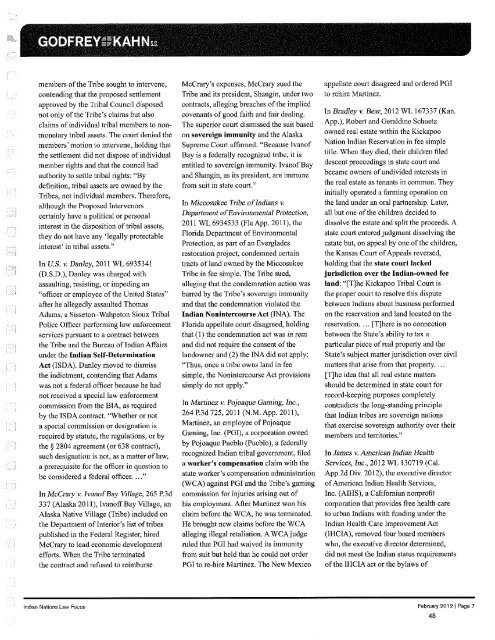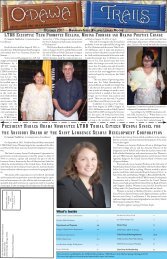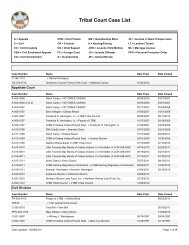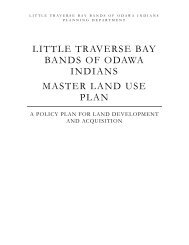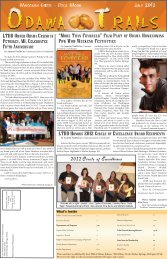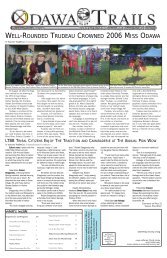United Tribes ) Michigan - Little Traverse Bay Bands of Odawa Indians
United Tribes ) Michigan - Little Traverse Bay Bands of Odawa Indians
United Tribes ) Michigan - Little Traverse Bay Bands of Odawa Indians
You also want an ePaper? Increase the reach of your titles
YUMPU automatically turns print PDFs into web optimized ePapers that Google loves.
members <strong>of</strong> the Tribe sought to intervene,<br />
contending that the proposed settlement<br />
approved by the Tribal Council disposed<br />
not only <strong>of</strong> the Tribe's claims but also<br />
claims <strong>of</strong> individual tribal members to nonmonetary<br />
tribal assets. The court denied the<br />
members' motion to intervene, holding that<br />
the settlement did not dispose <strong>of</strong> individual<br />
member rights and that the council had<br />
authority to settle tribal rights: "By<br />
definition, tribal assets are owned by the<br />
<strong>Tribes</strong>, not individual members. Therefore,<br />
although the Proposed Intervenors<br />
certainly have a political or personal<br />
interest in the disposition <strong>of</strong> tribal assets,<br />
they do not have any 'legally protectable<br />
interest' in tribal assets."<br />
In U.S. v. Danley, 2011 WL 6935341<br />
(D.S.D.), Danley was charged with<br />
assaulting, resisting, or impeding an<br />
"<strong>of</strong>ficer or employee <strong>of</strong> the <strong>United</strong> States"<br />
after he allegedly assaulted Thomas<br />
Adams, a Sisseton—Wahpeton Sioux Tribal<br />
Police Officer performing law enforcement<br />
services pursuant to a contract between<br />
the Tribe and the Bureau <strong>of</strong> Indian Affairs<br />
under the Indian Self-Determination<br />
Act (ISDA). Danley moved to dismiss<br />
the indictment, contending that Adams<br />
was not a federal <strong>of</strong>ficer because he had<br />
not received a special law enforcement<br />
commission from the BIA, as required<br />
by the ISDA contract. "Whether or not<br />
a special commission or designation is<br />
required by statute, the regulations, or by<br />
the § 2804 agreement (or 638 contract),<br />
such designation is not, as a matter <strong>of</strong> law,<br />
a prerequisite for the <strong>of</strong>ficer in question to<br />
be considered a federal <strong>of</strong>ficer. ..."<br />
In McCrary v. Ivan<strong>of</strong> <strong>Bay</strong> Village, 265 P.3d<br />
337 (Alaska 2011), Ivan<strong>of</strong>f <strong>Bay</strong> Village, an<br />
Alaska Native Village (Tribe) included on<br />
the Department <strong>of</strong> Interior's list <strong>of</strong> tribes<br />
published in the Federal Register, hired<br />
McCrary to lead economic development<br />
efforts. When the Tribe terminated<br />
the contract and refused to reimburse<br />
Inchon Nations Law Focus<br />
McCrary's expenses, McCrary sued the<br />
Tribe and its president, Shangin, under two<br />
contracts, alleging breaches <strong>of</strong> the implied<br />
covenants <strong>of</strong> good faith and fair dealing.<br />
The superior court dismissed the suit based<br />
on sovereign immunity and the Alaska<br />
Supreme Court affirmed: "Because Ivan<strong>of</strong><br />
<strong>Bay</strong> is a federally recognized tribe, it is<br />
entitled to sovereign immunity. Ivan<strong>of</strong> <strong>Bay</strong><br />
and Shangin, as its president, are immune<br />
from suit in state court."<br />
In Miccosukee Tribe <strong>of</strong> <strong>Indians</strong> v.<br />
Department <strong>of</strong> Environmental Protection,<br />
2011 WL 6934533 (Fla App. 2011), the<br />
Florida Department <strong>of</strong> Environmental<br />
Protection, as part <strong>of</strong> an Everglades<br />
restoration project, condemned certain<br />
tracts <strong>of</strong> land owned by the Miccosukee<br />
Tribe in fee simple. The Tribe sued,<br />
alleging that the condemnation action was<br />
barred by the Tribe's sovereign immunity<br />
and that the condemnation violated the<br />
Indian Nonintercourse Act (INA). The<br />
Florida appellate court disagreed, holding<br />
that (1) the condemnation act was in rem<br />
and did not require the consent <strong>of</strong> the<br />
landowner and (2) the INA did not apply:<br />
"Thus, once a tribe owns land in fee<br />
simple, the Nonintercourse Act provisions<br />
simply do not apply."<br />
In Martinez v. Pojoaque Gaming, Inc.,<br />
264 P.3d 725, 2011 (N.M. App. 2011),<br />
Martinez, an employee <strong>of</strong> Pojoaque<br />
Gaming, Inc. (PGI), a corporation owned<br />
by Pojoaque Pueblo (Pueblo), a federally<br />
recognized Indian tribal government, filed<br />
a worker's compensation claim with the<br />
state worker's compensation administration<br />
(WCA) against PGI and the Tribe's gaming<br />
commission for injuries arising out <strong>of</strong><br />
his employment. After Martinez won his<br />
claim before the WCA, he was terminated.<br />
He brought new claims before the WCA<br />
alleging illegal retaliation. A WCA judge<br />
ruled that PGI had waived its immunity<br />
from suit but held that he could not order<br />
PGI to re-hire Martinez. The New Mexico<br />
appellate court disagreed and ordered PGI<br />
to rehire Martinez.<br />
In Bradley v. Bear, 2012 WL 167337 (Kan.<br />
App.), Robert and Geraldine Schuetz<br />
owned real estate within the Kickapoo<br />
Nation Indian Reservation in fee simple<br />
title. When they died, their children filed<br />
descent proceedings in state court and<br />
became owners <strong>of</strong> undivided interests in<br />
the real estate as tenants in common. They<br />
initially operated a farming operation on<br />
the land under an oral partnership. Later,<br />
all but one <strong>of</strong> the children decided to<br />
dissolve the estate and split the proceeds. A<br />
state court entered judgment dissolving the<br />
estate but, on appeal by one <strong>of</strong> the children,<br />
the Kansas Court <strong>of</strong> Appeals reversed,<br />
holding that the state court lacked<br />
jurisdiction over the Indian-owned fee<br />
land: "[T]he Kickapoo Tribal Court is<br />
the proper court to resolve this dispute<br />
between <strong>Indians</strong> about business performed<br />
on the reservation and land located on the<br />
reservation. ... [T]here is no connection<br />
between the State's ability to tax a<br />
particular piece <strong>of</strong> real property and the<br />
State's subject matter jurisdiction over civil<br />
matters that arise from that property. ...<br />
[T]he idea that all real estate matters<br />
should be determined in state court for<br />
record-keeping purposes completely<br />
contradicts the long-standing principle<br />
that Indian tribes are sovereign nations<br />
that exercise sovereign authority over their<br />
members and territories."<br />
In James v. American Indian Health<br />
Services, Inc., 2012 WL 130719 (Cal.<br />
App.2d Div. 2012), the executive director<br />
<strong>of</strong> American Indian Health Services,<br />
Inc. (AIHS), a Californian nonpr<strong>of</strong>it<br />
corporation that provides free health care<br />
to urban <strong>Indians</strong> with funding under the<br />
Indian Health Care Improvement Act<br />
(IHCIA), removed four board members<br />
who, the executive director determined,<br />
did not meet the Indian status requirements<br />
<strong>of</strong> the IHCIA act or the bylaws <strong>of</strong><br />
February 2012 I Page 7<br />
48


